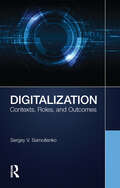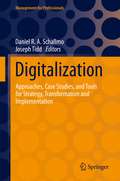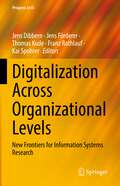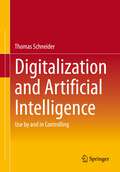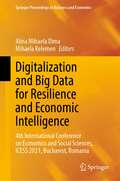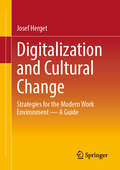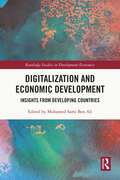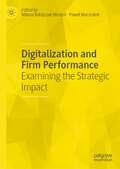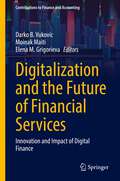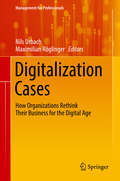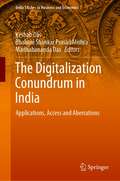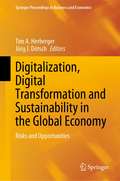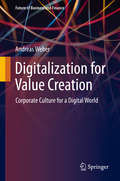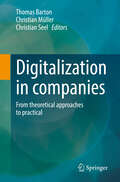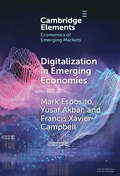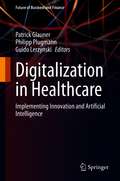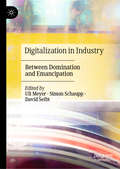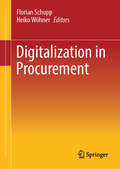- Table View
- List View
Digitalízate ¿Por dónde empezar?: Cómo transformar tu empresa para la era digital
by Eduardo Torres Llosa V.Digitalízate ¿Por dónde empezar? es un viaje que, a través de la experiencia y los aprendizajes de Eduardo, le permitirá a cualquier CEO digitalizarse. Muy ágil y descriptivo, me enganchó desde la primera línea. Lieneke Schol Miembro del Directorio de Alicorp, Banco Pichincha Eduardo cuestiona su propia experiencia, relata su aprendizaje con honestidad e incluso reconoce sus errores, y lo hace con la genuina intención de trazar un camino hacia la transformación digital. ¿Lo mejor? Es realista en un mundo incierto. David Reyes Zamora Director de Contenidos de Semana Económica Este libro está dirigido a todos aquellos que desean dinamizar la cultura digital en sus empresas o negocios, pero no saben por dónde empezar. Desde la experiencia de haber liderado y ejecutado un intenso proceso de transformación digital en el BBVA, Eduardo Torres Llosa brinda consejos y herramientas indispensables en el ámbito organizacional para afrontar los desafíos tecnológicos del siglo XXI. Alineamiento estratégico, nuevas formas de trabajo tipo agile, planificación por sprints, uso de plataformas colaborativas, visión de procesos end to end, entre otros; y la adaptación a las modalidades del teletrabajo y la educación a distancia, impulsadas por la crisis global del covid-19, son algunos de los cambios y aprendizajes propuestos por el autor para llevar a tu organización a actuar de modo eficaz en esta era digital.
Digitalization: Contexts, Roles, and Outcomes
by Sergey V. SamoilenkoConceptually, as well as practically, digitalization is similar to the implementation of a modern computation model – the model may be a centralized setup using a mainframe or it may be extended to an N-tier architecture. Regardless of the specifics of the implementation, however, the conceptual model of data processing remains the same. Digitalization is nothing but a system relying on digital technologies to create, conduct and, potentially, expand a business activity of some sort. Digitalization can be used to create an e-commerce model for a small business or to create a global supply and distribution chain geared toward almost any kind of a business. It could also be used for non-profit purposes, such as on-line education and telemedicine or e-government. Digitalization: Contexts, Roles, and Outcomes is a contemplation and analysis of the socio-technical system that is known as digitalization. It considers the context of digitalization as well as the ways by which digitalization offers value to the context within which it operates. This book aims to offer readers an entry point to a path of inquiry into the different aspects of digitalization. The goal is to identify main directions for further inquiry as well as to outline the most obvious obstacles along the way. The book aims to guide readers on their own unique journeys using the basic ideas, principles, and concepts synthesized, developed, and presented in the book. It is beneficial to both practitioners and researchers. The book covers: The functionality of digitalization The significance of digitalization Identifying the context of digitalization Designing a control system A cognitive model for the theory of digitalization Designing a theory of digitalization The book helps readers to consider the subject of digitalization in a rigorous and rational way so their own perspectives can emerge stronger and be substantiated and reinforced by building an argument vis-à-vis perspectives and points examined in this book.
Digitalization: Approaches, Case Studies, and Tools for Strategy, Transformation and Implementation (Management for Professionals)
by Daniel R. A. Schallmo Joseph TiddWhat do vehicle manufacturers like Rosenbauer, logistics companies like DB Schenker, a compressor manufacturer such as Bauer, an elevator manufacturer such as ThyssenKrupp, and a hygiene goods manufacturer like Hagleitner all have in common? They all use the potential of digitization to offer smarter and faster services to customers and to actively shape the digital transformation of their business models. This book provides valuable insights with concise and established guidelines for the successful digital transformation of business models. Professionals in management, strategic planning, business development, as well as researchers and students from the fields of innovation/technology management, strategic management, and entrepreneurship would particularly benefit from this book.
Digitalization Across Organizational Levels: New Frontiers for Information Systems Research (Progress in IS)
by Kai Spohrer Jens Dibbern Franz Rothlauf Jens Förderer Thomas KudeThis book covers a broad range of topics related to digitalization. Specifically, it views digitalization across different organizational levels, such as the level of individuals, teams, processes, firms, and ecosystems. It includes a collection of recent research and reflections on the topic that helps to understand the technological foundations of digitalization and its impacts. It also reflects on the process of digitalization and how it changes established ways of working, collaborating, and coordinating.With this book, the editors and authors honor Professor Dr. Armin Heinzl for his enormous and ongoing contributions to information systems research, education, and practice.
Digitalization and Artificial Intelligence: Use by and in Controlling
by Thomas SchneiderThe possibilities and limits of digitalization in general and artificial intelligence in particular are demonstrated in a practice-oriented manner. Ways to generate and secure competitive advantages are presented. The topic is examined from the perspective of the company, the function of controlling and the personal position in controlling. The aim is rather to accompany the reader in the concrete implementation than to present a uniform guide.
Digitalization and Big Data for Resilience and Economic Intelligence: 4th International Conference on Economics and Social Sciences, ICESS 2021, Bucharest, Romania (Springer Proceedings in Business and Economics)
by Alina Mihaela Dima Mihaela KelemenThis book highlights the economic and social science perspectives in light of COVID-19. During 2020, leaders found themselves at historic crossroads, taking decisions under remarkable pressures and uncertainties. However, windows of opportunity are being created to shape the economic recovery, restore the health of the environment, develop sustainable business models, strengthen regional development, revitalize global cooperation, harness Industry 4.0, and redesign the social contracts, skills, and jobs. This book is an excellent resource for all those interested in economics and social sciences perspectives on digitalization and big data, especially in the light of the recent crisis determined by COVID-19. The chapters cover topics related to new models in entrepreneurship and innovation, sustainability and education, data science and digitalization, marketing and finance, etc., that will develop innovative instruments for countries, businesses, and education to revive after the crisis.
Digitalization and Competition Policy in Japan
by Shuya Hayashi Koki AraiThis book organizes the intent and purpose of the Japanese competition law (Antimonopoly Act) to address the digitalized socio-economy and provides a detailed explanation of its basic content as well as advanced issues. It includes an overview of Japanese law and its international position, a basic understanding of the big data and AI issues in today's competition law, and perspectives on high-tech regulation. In addition, it includes a variety of important topics, ranging from exploring principles to tackle digital regulatory realities, to understanding and analyzing the competitive realities of multisided markets. It also examines the relationship between information and competition law and that between consumer and competition law.Digitalization is a key concept in our economy and society today. Carbon neutrality initiatives, the need to improve productivity, globalization, and new ways of working are all seeking breakthroughs by way of digitalization. What’s more, digitalization requires free and fair competition in order to encourage technological innovation. The search for transparent and clear competition laws is essential to promote efficient and effective research and development and to promote public awareness through competition.
Digitalization and Cultural Change: Strategies for the Modern Work Environment – A Guide
by Josef HergetThis book illustrates the importance of cultural change in the digitalization of companies and organizations. This affects not only work processes and the design of new work environments but also the implementation of innovative business models. Although the significance of cultural change is repeatedly emphasized in the literature and highlighted as crucial for the success of transformation projects, concrete action steps and its integration into a comprehensive corporate culture concept are lacking. The conscious design of a hybrid corporate culture specifically enables the potential for performance enhancement to be combined with employee satisfaction and productivity. In this revised and significantly expanded second edition, concrete concepts are presented on how digital transformation can be methodically implemented with an appropriate corporate culture. This practice-oriented book provides companies and consultants with proven models, concepts, and approaches to ensure the sustainable success of digital transformation.
Digitalization and Economic Development: Insights from Developing Countries (Routledge Studies in Development Economics)
by Mohamed Sami Ben AliThis book analyses the impact of Information and Communication Technologies (ICTs) on economic development. It contains theoretical and empirical studies, including panel studies on various issues facing developing countries, such as education, corruption, economic growth, government expenditure, financial inclusion, foreign direct investment, infrastructure, economic and social welfare, and inequality. Each chapter offers a well-conceived analysis of the most recent trends in both theory and empirics and addresses numerous policy implications related to the different aspects dealt with in the volume. Overall, this book will be an excellent guide for global graduate students at the Master and PhD levels, as well as academics researching various issues related to economic development while analyzing the role of ICTs. It also addresses numerous policy implications related to economic development for policymakers, investors and stakeholders.
Digitalization and Firm Performance: Examining the Strategic Impact
by Milena Ratajczak-Mrozek Paweł MarszałekThis book explores how digitalization and digital technologies influence markets, firms, financial institutions and organizations. Drawing on examples from Canada, Poland, France, Albania, Africa and Turkey this book takes a truly international perspective. It explores the technical aspects of digitalization, with chapters examining topics like how digitization creates value in a small company, how digital-driven business drives innovation, how import-exporting firms can increase productivity within the digital economy and how financial systems and institutions evolve due to new technologies. However, the book goes beyond this and, by adopting a holistic view, examines the social impact of digitalization, with the authors discussing how trade unions and employers present Industry 4.0 to employees and the general public. This book will be of interest to anyone studying digital innovation, digital management, digital strategy, Fin Tech, firm management, and Industry 4.0.Chapter 1 is available open access under a Creative Commons Attribution 4.0 International License via link.springer.com.
Digitalization and Sustainable Manufacturing: Twin Transition in Norway (Routledge Advances in Production and Operations Management)
by Sverre Gulbrandsen-Dahl Halvor Holtskog Heidi C. Dreyer Einar L. Hinrichsen Gabor Sziebig Håkon Raabe Kristian MartinsenThe manufacturing industry is facing massive changes driven by digitalization and sustainability. It is being redefined to meet the UN SDGs with the creation of new materials, processes and machinery. The drive for digitalization in order to use resources more effectively and efficiently adds to the complexity of this twin transition. This book presents results from 8 years of research with 15 industry partners, following the transition towards a digitalized industry 4.0 manufacturing and sustainable manufacturing paradigm.The selected chapters demonstrate how globally competitive manufacturing in high-cost countries such as Norway is enabled by AI-supported intelligent and flexible automation and the use of digital twins, as well as human-centred manufacturing. This book describes the interactions in innovative and sustainable organizations and changes in materials, products and processes, digital twins and AI-supported automated manufacturing processes. Supported by case studies and reflections from the manufacturing industry, this book evaluates how the combination of digitalization and sustainability enables competitiveness. With a focus on multi-material products and processes, robust and flexible automation and innovative and sustainable organizations, it provides a multi-disciplinary insight into the challenges and opportunities faced by manufacturing industries over time.This book serves as an ideal reference for researchers, scholars and policymakers in manufacturing, production and operations, with a particular interest in technology and sustainability.
Digitalization and the Future of Financial Services: Innovation and Impact of Digital Finance (Contributions to Finance and Accounting)
by Darko B. Vukovic Moinak Maiti Elena M. GrigorievaThis book develops insights of digitalization and the future of financial services to originate an innovative approach to financial field, in order to underpin research and practice in the wide area of digital finance. The aim of this book is to extend our understandings on how digitalization and the future of financial services can be helpful in different business circumstances in many cross-functional financial areas, such as financial markets, financial risk management, financial technologies, investment finance, etc. Thus, the book aims at addressing the relevance of digital finance for different players, highlighting differences in tools and processes as well as identifying innovative practices in financial digitalization. This can result in some novel theoretical and practical insights that can foster financial players, in order to proactively explore and exploit opportunities in financial digitalization and offset financial risks and increase efficiency.
Digitalization at Siemens
by Tonia Junker David J. CollisProfessor David J. Collis and Research Assistant Tonia Junker (Europe Research Center) prepared this case. It was reviewed and approved before publication by a company designate. Funding for the development of this case was provided by Harvard Business School and not by the company. HBS cases are developed solely as the basis for class discussion. Cases are not intended to serve as endorsements, sources of primary data, or illustrations of effective or ineffective management.
Digitalization Cases: How Organizations Rethink Their Business for the Digital Age (Management for Professionals)
by Nils Urbach Maximilian RöglingerThis book presents a rich compilation of real-world cases on digitalization, the goal being to share first-hand insights from respected organizations and to make digitalization more tangible. As virtually every economic and societal sector is now being challenged by emerging technologies, the digital economy is a highly volatile, uncertain, complex and ambiguous place – and one that holds substantial challenges and opportunities for established organizations. Against this backdrop, this book reports on best practices and lessons learned from organizations that have succeeded in overcoming the challenges and seizing the opportunities of the digital economy. It illustrates how twenty-one organizations have leveraged their capabilities to create disruptive innovations, to develop digital business models, and to digitally transform themselves. These cases stem from various industries (e.g. automotive, insurance, consulting, and public services) and countries, reflecting the many facets of digitalization. As all case descriptions follow a uniform schema, they are easily accessible, and provide insightful examples for practitioners as well as interesting cases for researchers, teachers and students.Digitalization is reshaping business on a global scale, and it is evident that organizations must transform to thrive in the digital economy. Digitalization Cases provides first-hand insights into the efforts of renowned companies. The presented actions, results, and lessons learned are a great inspiration for managers, students, and academics.Anna Kopp, Head of IT Germany, MicrosoftUnderstanding digitalization in all its facets requires knowledge about its opportunities and challenges in different contexts. Providing 21 cases from different companies all around the world, Digitalization Cases makes an important contribution toward the comprehensibility of digitalization – from a practical and a scientific point of view.Dorothy Leidner, Ferguson Professor of Information Systems, Baylor UniversityThis book is a great source of inspiration and insight on how to drive digitalization. It shows easy to understand good practice examples which illustrate opportunities, and at the same time helps to learn what needs to be done to realize them. I consider this book a must-read for every practitioner who cares about digitalization.Martin Petry, Chief Information Officer and Head of Business Excellence, Hilti
Digitalization Cases Vol. 2: Mastering Digital Transformation for Global Business (Management for Professionals)
by Martin Wiener Carol Saunders Nils Urbach Maximilian Röglinger Karlheinz Kautz Rose Alinda AliasThis book presents a rich compilation of real-world cases on digitalization, aiming to share first-hand insights from renowned organizations and to make digitalization tangible. With all economic and societal sectors being challenged by emerging technologies, the digital economy is highly volatile, uncertain, complex, and ambiguous. It confronts established organizations with substantial challenges and opportunities. Against this backdrop, this book reports on best practices and lessons learned from organizations that succeeded in tackling the challenges and seizing the opportunities of the digital economy. It illustrates how twenty organizations leveraged their capabilities to create disruptive innovation, to develop digital business models, and to digitally transform themselves. These cases stem from various industries (e.g. automotive, insurance, consulting, and public services) and countries, covering the many facets that digitalization may have. As all case descriptions follow a unified template, they are easily accessible for readers and provide insightful examples for practitioners as well as interesting cases for researchers, teachers, and students. Almost every organization is trying to figure out how best to respond to the opportunities and threats posed by digitalization. This book provides valuable lessons from those organizations that have already begun their digital transformation journey.Michael D. Myers, Professor of Information Systems, University of AucklandDigitalization Cases provides firsthand insights into the efforts of renowned companies. The presented actions, results, and lessons learned are a great inspiration for managers, students, and academics. This book gives real pointers on the how and where to start.Anna Kopp, Head of IT Germany, MicrosoftThe cases compiled in the second volume of Digitalization Cases show how disruption can actively be managed. Further, long-term insights from extended success stories of the first edition highlight that courage to change pays off well. This book represents a motivation for organizations to drive their digital transformation journeys actively.Markus Richter, State Secretary at the Federal Ministry of the Interior, Building and Community and Federal Government Commissioner for Information Technology, Germany
The Digitalization Conundrum in India: Applications, Access and Aberrations (India Studies in Business and Economics)
by Keshab Das Bhabani Shankar Prasad Mishra Madhabananda DasThis book examines the nature, extent and implications of rapid strides digitalization has made in India since the turn of the millennium. These have been examined not merely in the sphere of information and communication technology (ICT) but its multifarious applications spreading across almost all aspects of production, services and institutions which have profound repercussions for the transformation of the society and economy at the micro, meso and macro levels. With contributions from both ICT scholars and social scientists, this book presents diverse scenarios and unravels challenges faced in the process of technical applications, access by the users of these disruptive technologies (automation, e-commerce, big data analytics & algorithms, artificial intelligence, cloud computing, etc.) which, unlike heavy machines (embodied technology), mostly defy physical space, pace of mobility and inoperability between technologies. Chapters in this volume address challenges and possibilities in establishing and operating intricate engineering infrastructure, technical and societal constraints encountered in broad-basing digitalization across layers of educational and social skills conducive to difficult geographies. Issues dealt within this book include farming, healthcare, education, food processing, e-commerce, labour, rural community development, open source data and information democracy. The chapters also reflect upon implications on local economy and society, of the very global nature of these seamless technologies where inter-operability remains the quintessential advantage of digitalization whether promoted or spearheaded through the state, private sector or global capital. The book critiques policy inadequacies and suggests plausible policy approaches to reduce the adverse impacts of fast digitalization and broad-base potential benefits across space and levels of socio-economic development of regions and society. This book would be of interest to scholars, practitioners, technocrats, industry analysts, policy makers and civil society agencies.
Digitalization, Digital Transformation and Sustainability in the Global Economy: Risks and Opportunities (Springer Proceedings in Business and Economics)
by Tim A. Herberger Jörg J. DötschThis book highlights the opportunities and risks of digitalization and digital transformation for our global economy at both the micro and macro level. Experts from various fields, presenting both scientific and practice-oriented perspectives, identify and critically analyse areas of tension and development potential in connection with new business models and sustainability efforts in our society. It is divided into four parts, the first of which highlights new technological advances in areas such as blockchain, cryptocurrencies and fintechs, and discusses the challenges they pose for public regulation. The second part illustrates digitalization’s effects on and potential advantages for public welfare, focusing on key areas such as education, health and smart cities. The third part focuses on challenges for corporate and public management, particularly for leadership and Corporate Social Responsibility, while the fourth part discusses new dimensions for analysis based on big data. The contributions gathered here are partly an outcome of the International Conference on Digitalization, Digital Transformation and Sustainability held in Budapest in October 2020 and generously supported by the Hanns Seidel Foundation.
Digitalization for Value Creation: Corporate Culture for a Digital World (Future of Business and Finance)
by Andreas WeberDigitalization is the greatest change project that we have ever known, and data is circulating in unimaginable quantities and at unimaginable speed. In this book, the author urges managers and business leaders to embrace this constant state of change in cooperation with their team. He addresses how corporate culture and hierarchies have to change to adapt to new digital workspaces and value chains. These changes also include questions about the use and storage of data, customer relations and international teamwork. The book is especially geared towards managers in manufacturing industries and companies.
Digitalization in companies: From theoretical approaches to practical
by Thomas Barton Christian Müller Christian SeelThe book conveys current approaches to digitization in companies and shows how digitization projects can be successfully and safely implemented in practice. Based on the description of a changing value creation and working world, the changes associated with digitization are explained using application scenarios: New business models and business processes are being established, the development of products is changing as is the interaction with customers, new opportunities but also new risks are emerging. The authors of the article present the basics as well as concepts for the concrete planning and implementation of the digitization of processes and applications. Aspects of IT security are not neglected either. The editors' work is based on questions from entrepreneurial practice and is also suitable for students and teachers.
Digitalization in Emerging Economies (Elements in the Economics of Emerging Markets)
by null Mark Esposito null Yusaf Akbar null Francis Xavier Campbell'Digitalization in Emerging Economies' offers a comprehensive exploration of digitalization's transformative potential in the Global South. The book examines the digital revolution's impact on businesses, governments, and individuals in emerging economies. It highlights the paradigm shift in these markets due to advancements like mobile technology, internet connectivity, e-commerce platforms, and digital payment systems. The book also addresses challenges such as privacy, cybersecurity, and the digital divide. It explores the drivers and barriers of digital adoption, the effects on industries and labor markets, and the role of government policies in shaping digital ecosystems. 'Digitalization in Emerging Economies' aims to guide those navigating the digital landscape in a rapidly changing world, contributing to the discourse on leveraging digital technologies for inclusive and sustainable development.
Digitalization in Finance and Accounting: 20th Annual Conference on Finance and Accounting (ACFA 2019) Prague, Czech Republic (Springer Proceedings in Business and Economics)
by David ProcházkaThis book explores current digitalization issues in finance and accounting with particular focus on emerging and transitioning markets. It features models, empirical studies and cases studies on topics such as Fintech, blockchain technology, financing renewable energy, and XBRL usage from sectors such health care, pharmacology, transportation, and education. Such a complex view of current economic phenomena makes the volume attractive not only for academia, but also for regulators and policy-makers, when deliberating the potential outcome of competing regulatory mechanisms.
Digitalization in Healthcare: Implementing Innovation and Artificial Intelligence (Future of Business and Finance)
by Patrick Glauner Philipp Plugmann Guido LerzynskiDigital technologies are currently dramatically changing healthcare. This book introduces the reader to the latest digital innovations in healthcare in fields such as artificial intelligence, points out new ways in patient care and describes the limits of its application. It also offers essential guidance in the form of structured and authoritative contributions by domain experts spanning from artificial intelligence to hospital management to radiology to dentistry to preventive medicine. Furthermore, it shares ideas and experiences of industry veterans, in particular on howIT-driven solutions could solve long-standing issues in the fields of healthcare andhospitalization. It also gives advice on what new digital technologies to consider for becoming a healthcare market leader in the future. Taken together, these contributions provide a “road map” to guide decision makers, physicians, academics, industry representatives and other interested readers to understand the large impact of digital technology on healthcare today and its enormous potential for future development.
Digitalization in Industry: Between Domination and Emancipation
by Uli Meyer Simon Schaupp David SeibtThis book traces how the current wave of industrial digitalization relates to processes of domination and emancipation. It aims to counter techno-deterministic narratives that would connect a perceived new ‘industrial revolution’ with clear-cut societal consequences. In order to do this, the volume intervenes into three ongoing discussions which pertain to emancipation and domination in the workplace, promises of emancipation through digital fabrication, and the idea of emancipating, configuring, and infrastructuring the users of industrial products. Within this framework it addresses topics including democratic participation, management thinking, gamification, the maker movement, reshoring, digital platforms, and the automation of healthcare.
Digitalization in Procurement
by Florian Schupp Heiko WöhnerThe book vividly describes how digitalization affects and changes procurement in companies in various ways. Numerous contributions from academia and practice show design options and provide advice for practical implementation. In this context, procurement encompasses not only the classic areas of supplier search, negotiation, and nomination on one side but also supplier development in terms of quality and technology as well as supply management on the other side, with the goal of ensuring efficient production and production control. In this design area of procurement, 15 starting points for digitalization are located and outlined in content. The implementation of digitalization in procurement offers opportunities for both buyers and suppliers. In the 2nd edition, the chapters have been updated, and topics such as digital twins and collaborative digitalization approaches in supplier quality and supply management have been newly included.
Digitalization in the Luxury Fashion Industry: Strategic Branding for Millennial Consumers (Palgrave Advances in Luxury)
by Anna CabigiosuThe luxury fashion industry is one of the best performing and fastest growing industries in today’s business landscape, and is set to continue expanding over the next years. Exploring the effects of digitalization, this book aims to increase our understanding of the key drivers of internal growth and competitiveness in luxury fashion firms. With a focus on the development of new brand strategies brought about by digitalization, the author outlines the need for business models to be redesigned in order to make use of social media and satisfy Millennial consumers. Offering case studies on leading luxury fashion brands, this timely book evaluates new digital technologies and strategies including omnichannel marketing, 3D printing and smart textiles. A must-read for those researching digital marketing and branding, as well as luxury or fashion management, this book provides a much-needed and up-to-date analysis of a successful and digitally aware industry.

